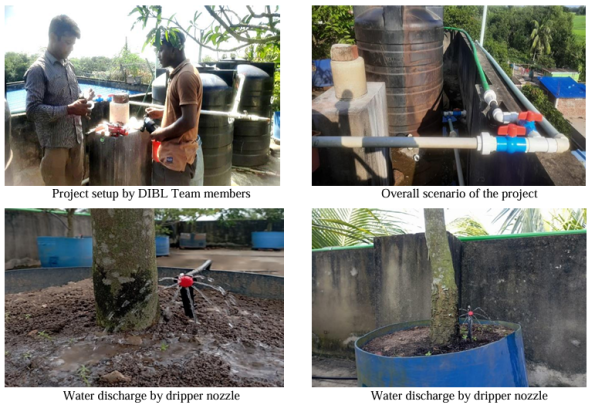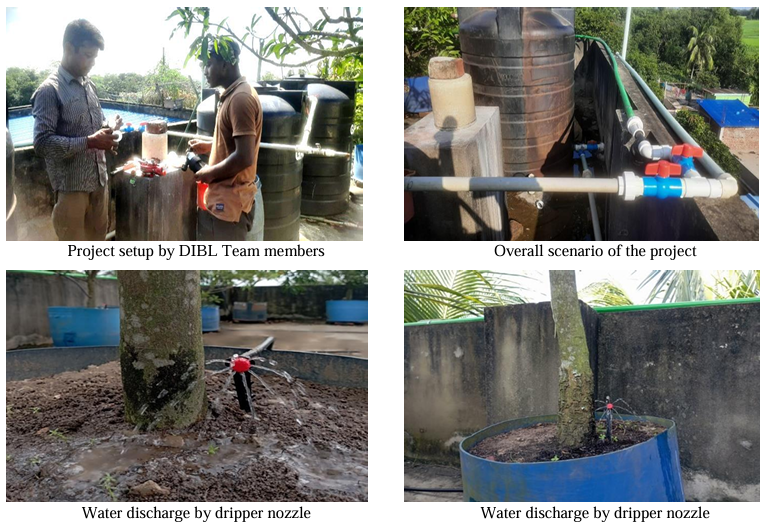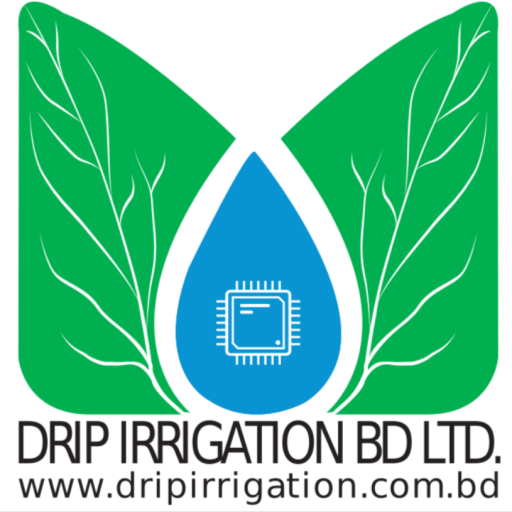This innovative project, spearheaded by the dedicated team members of DIBL, focuses on implementing an advanced drip irrigation system for crops. While the exact location of this particular setup isn’t specified in the images, similar projects have been successfully deployed across various farms in Bangladesh, demonstrating DIBL’s commitment to modernizing agriculture nationwide. The primary goal of this initiative is to address critical challenges faced by farmers, such as water scarcity, inefficient water distribution, and the high labor requirements of traditional irrigation methods.

The technical brilliance of this system lies in its simplicity and effectiveness. DIBL utilizes high-quality dripper nozzles that deliver water directly to the plant’s root zone, minimizing waste and maximizing absorption. What’s truly remarkable is how straightforward the setup process is. Farmers can easily install these systems themselves with basic tools, or they can opt to hire a local plumber or technician. And for those who might encounter difficulties, DIBL’s expert engineers are always on hand to provide comprehensive guidance and support, ensuring a smooth and successful implementation.
Unlocking Agricultural Potential: Key Benefits for Farmers & Entrepreneurs
The impact of such innovative irrigation systems extends far beyond simply watering plants; it’s a game-changer for agricultural productivity and sustainability.
Revolutionizing Water Efficiency
One of the most striking advantages of drip irrigation is its unparalleled water efficiency. Scientific studies, like those published in the Journal of Agricultural Water Management, consistently show that drip irrigation can reduce water usage by as much as 30-70% compared to traditional methods like flood irrigation. Imagine a farmer like Mr. Rahman, who previously spent hours channeling water across his fields, losing much of it to evaporation and runoff. With DIBL’s system, he now uses a fraction of the water, precisely delivering it where it’s needed most. “I used to worry about the cost of water and if I had enough for my crops,” shares Mr. Rahman from a DIBL project site. “Now, with the drippers, I see a huge difference. My water bills are lower, and my plants look healthier than ever!”
Boosting Crop Yields and Quality
The precise and consistent water delivery of drip irrigation systems creates optimal growing conditions for plants, leading to significant improvements in crop yield and quality. Crops like mango, coffee, and various vegetables respond exceptionally well to this method. By providing a steady supply of moisture and nutrients directly to the roots, plants experience less stress, resulting in more robust growth and increased fruit or vegetable production. This means more produce for farmers to sell and higher quality products for consumers.
Significant Cost Savings
Beyond water savings, drip irrigation translates into substantial cost reductions for farmers. Reduced water consumption directly lowers utility bills. Furthermore, the localized application of water minimizes weed growth between rows, as the areas not directly under the drippers remain dry. This means less need for costly herbicides and a significant reduction in the labor required for weeding. “We used to spend so much on weedicides and hiring people for weeding,” comments a farmer from a DIBL-implemented farm. “With this system, those expenses have practically vanished. It’s truly a blessing for our pockets.” The precise delivery also means less fertilizer runoff, making every gram of nutrient more effective and leading to lower fertilizer consumption.
Smart Automation for Modern Farming
Many of DIBL’s solutions incorporate smart features like timers, making irrigation an automated process. This means farmers no longer need to spend countless hours manually irrigating their fields. While not explicitly shown in the screenshot, DIBL’s expertise extends to integrating IoT (Internet of Things) for remote monitoring, allowing farmers to control and monitor their systems from anywhere, providing unparalleled convenience and control.
Cultivating Long-Term Sustainability
Drip irrigation is inherently eco-friendly. By precisely applying water, it prevents waterlogging and nutrient leaching, which can degrade soil health over time. This method also significantly reduces soil erosion, preserving valuable topsoil and ensuring the long-term fertility of agricultural land. It’s an investment in the planet as much as it is in the farm.
Maximizing Time and Labor Savings
The automation inherent in drip irrigation systems is a game-changer for a farmer’s most valuable resources: time and labor. No longer do farmers need to spend arduous hours manually moving hoses or tending to flood irrigation. The system handles the water delivery, freeing up their time for other crucial farm management tasks, family, or even exploring new income streams. This efficiency allows for greater productivity without increased effort.
Initial Investment vs. Long-Term Savings: A Smart Choice
It’s true that the initial installation cost for a drip irrigation system can be a one-time higher investment compared to traditional methods. However, this upfront cost is quickly offset by the significant long-term savings. Consider the story of Mr. Karim, a diligent farmer from Bogura. He initially hesitated due to the installation cost of DIBL’s system. But after the first harvest, he saw a 40% reduction in his water bills and a 25% increase in his vegetable yield. “The initial investment seemed big,” he recounted, “but within two seasons, I realized how much money I was saving on water, fertilizer, and labor. It’s the best decision I ever made for my farm.” This real-life success story underscores that the investment in drip irrigation is an investment in future prosperity.
Inspiring Growth: Opportunities in Modern Agriculture
DIBL’s projects serve as a powerful inspiration for other farmers and aspiring entrepreneurs. The success stories emerging from their implementations clearly demonstrate the immense potential of adopting modern irrigation techniques.
Guidance for Replication
For farmers looking to replicate this success, DIBL offers comprehensive guidance. Their team works closely with individuals to design customized solutions that fit specific farm sizes, crop types, and budgets. From system design to installation and maintenance, DIBL provides end-to-end support, making the transition to efficient irrigation seamless.
Investing in a Greener Future
The agricultural sector in Bangladesh, particularly in efficient irrigation, presents significant investment opportunities. With a growing population and increasing demand for food, technologies that enhance productivity and sustainability are highly sought after. Investors looking for impactful and profitable ventures should certainly consider this burgeoning field.
Tips for Agribusiness Startups
For new agribusiness startups, partnering with established experts like Drip Irrigation BD Ltd. (DIBL) can provide a solid foundation. Focus on niche crops that benefit most from precise irrigation, explore opportunities in contract farming, and leverage technology for smart farm management. DIBL, as an Orenge Corner Graduate and iDEA Portfolio Startup Company, stands as a testament to successful innovation in this sector. They encourage new ventures to join them in transforming Bangladesh’s agricultural landscape.
Connect with DIBL: Your Partner in Agricultural Excellence
Interested in implementing a cost-effective and highly efficient irrigation system for your farm or exploring business opportunities in this vital sector? Drip Irrigation BD Ltd. (DIBL) is ready to help you cultivate success.
Contact Us Today! Email: info@dripirrigationbd.com | Website: www.dripirrigation.com.bd
Head Office: Address: 2C/81, Parijat Apartment, North Adabor, Shyamoli, Dhaka-1207 Phone: 01324-445400 | Email: dibldhaka400@gmail.com Representative: Sadman Sarar (Public Relations Officer)
Branches:
- Dhaka: 2C/81, Parijat Apartment, North Adabor, Shyamoli, Dhaka-1207 | Phone: 01324-445411 | Email: dibldhaka411@gmail.com | Representative: Tanbirul Islam, Assistant Engineer
- Chattogram: A3/1st floor, Nazma Tower, Munni Commissioner Goli, Oxygen, Chattogram-4214 | Phone: 01324-445395 | Email: diblctg399@gmail.com | Representative: Mobinul Islam, Assistant Engineer
- Bogura: 4A, Twin Brother Phulbari Plaza, Santhahar Road, Charmatha, Bogura-5800 | Phone: 01324-445385 | Email: diblbogura385@gmail.com | Representative: Md. Samsuzzaman Sumon, Assistant Director
- Jashore: Phone: 01324-445390 | Email: dibljashore390@gmail.com | Representative: Md. Masud Rana, Assistant Engineer
- Sylhet: Queen’s tower, lift (4-A), near by over bridg, kadamtoli, Sylhet | Phone: +880 1919-751845 | Representative: Asadul Islam Shahoria, Sub-Assistant Engineer



